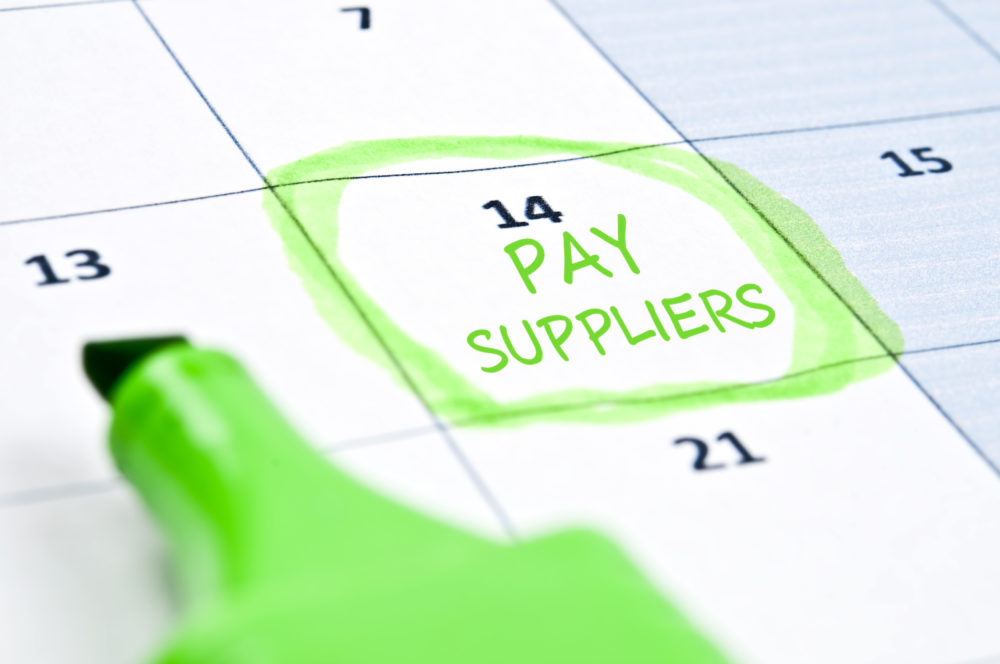A new government report shows how long it takes some of the high street’s biggest names to pay small suppliers.
The inquiry by the Business, Energy and Industrial Strategy Committee (BEIS) highlights issues which hinder small business productivity. These include payment practices, support and advice, leadership and digital skills.
Rachel Reeves MP, chair of BEIS, says that small companies face a host of challenges in trying to grow and boost their productivity, not least in handling the difficulties they face when they are paid late.
‘Supply chain bullying is all too commonplace. The correspondence the Business Committee has received suggests payment terms are getting longer and that big, high street companies are taking far too long to pay their suppliers.’
‘Many SMEs are placed in a stranglehold by larger companies deliberately paying late and ruthlessly taking advantage of their suppliers, causing these firms financial instability.’
She stresses that unless the government levels the playing field and acts to bring in a tougher regime for poor payment practices then we choke-off the opportunity for SMEs to invest and grow in the future.
How long does it take big companies to pay up?
Several high street businesses responded to BEIS’ inquiry, with Boots, WHSmith and Thomas Cook featuring on the list.
When it comes to payment, WHSmith have standard terms of 90 days and a maximum of 120 days while Boots UK have standard payment terms of 75 days and maximum payment terms of 120 days.
“Standard terms for some companies include a prompt payment discount”
Many of the companies questioned took more than 60 days to pay an invoice. Thomas Cook took an average of 88 days, Britvic Drinks 86 days, General Electric Energy Ltd 77 days, Holland and Barrett 68 days and Waterstones 65 days.
Suppliers may even get punished further as the standard terms for some companies includes a prompt payment discount. Boots say that they deduct 2.5 per cent discount from any company ‘irrespective of size’. Meanwhile, Robert Dyas said that they include a two per cent settlement discount, with zero per cent for any business with a turnover of less than £100,000. Some are even charged a fee for appearing on a suppliers list.

How successful has the Prompt Payment Code (PPC) been?
MPs say that the government’s Prompt Payment Code has been ineffective, with late payments still stopping businesses from growing and improving productivity.
Administered by the Chartered Institute of Credit Management, the Prompt Payment Code sets standards for payment practices. The code is voluntary and signatories can be removed for non-compliance.
Worryingly, the majority of businesses that responded to the inquiry aren’t signed up to the PPC, including WHSmith, Boots, Siemens, Nike, Yodel, Thomas Cook, Punch Taverns, Warner Music, Manchester United Football Club, Robert Dyas and Aston Villa Football Club.
Waitrose, GlaxoSmithKlein, Reed, Barratt, Capita and G4S are respondents of the inquiry that are signatories of the code.
It has become apparent that the construction industry is notorious for poor payment practices. Findings reveal that the infamous Carillion was on the PPC but took a mammoth 120 days to pay its suppliers.
BEIS’ report calls for the Small Business Commissioner’s remit to be extended to the construction industry on top of a curb of retention payments within the industry.
Other key recommendations
The report advises the government to introduce a statutory requirement for companies to pay invoices within 30 days. As well as that, the government should move quickly to require all medium and large companies to sign the Prompt Payment Code and equip the Small Business Commissioner with powers to fine companies that pay late.
A lot of policies and initiatives for small businesses rely on EU funding so entrepreneurs are worried about what will happen to these policies after Brexit. There’s a call for online support to be improved for SMEs and explain how it will match EU funding.
Moves to help SMEs with training needs, such as supplying vouchers and financial incentives for digital skills, are recommended too.
“The government should introduce a statutory requirement for companies to pay invoices within 30 days”
Finally, the government is on course to miss its target of offering 33 per cent of all of its central government contracts to SMEs by 2022. The BEIS wants the government to set out how they plan to meet the 2022 target.






